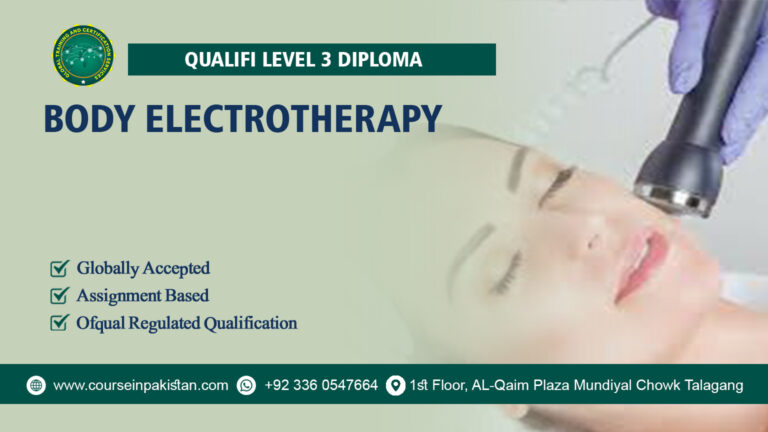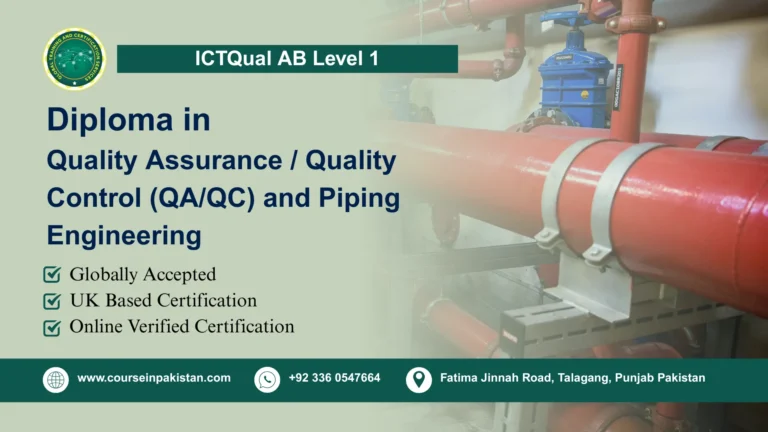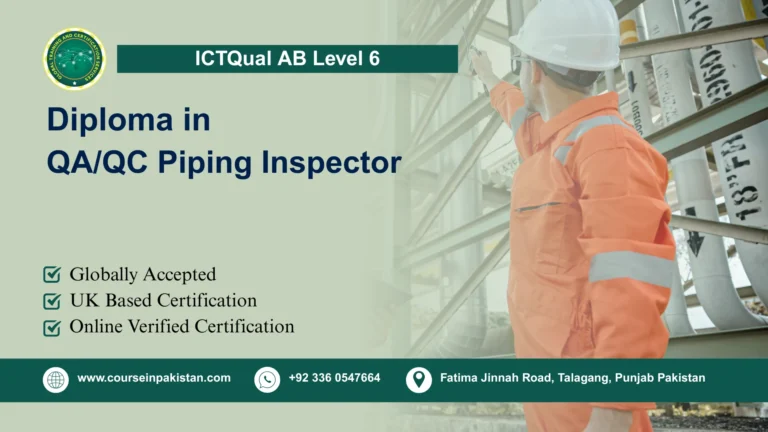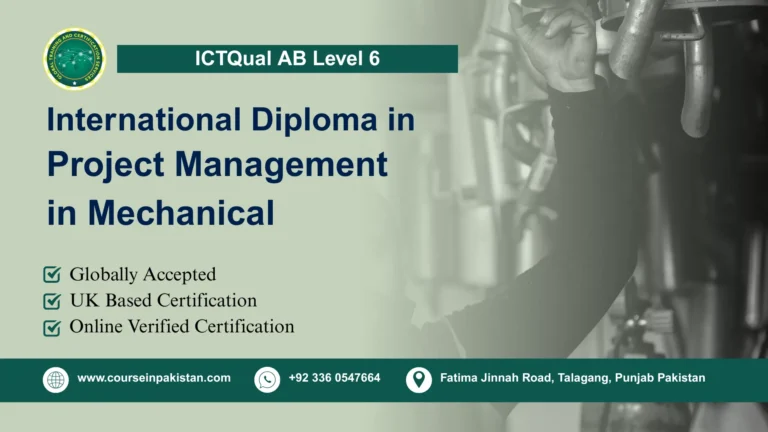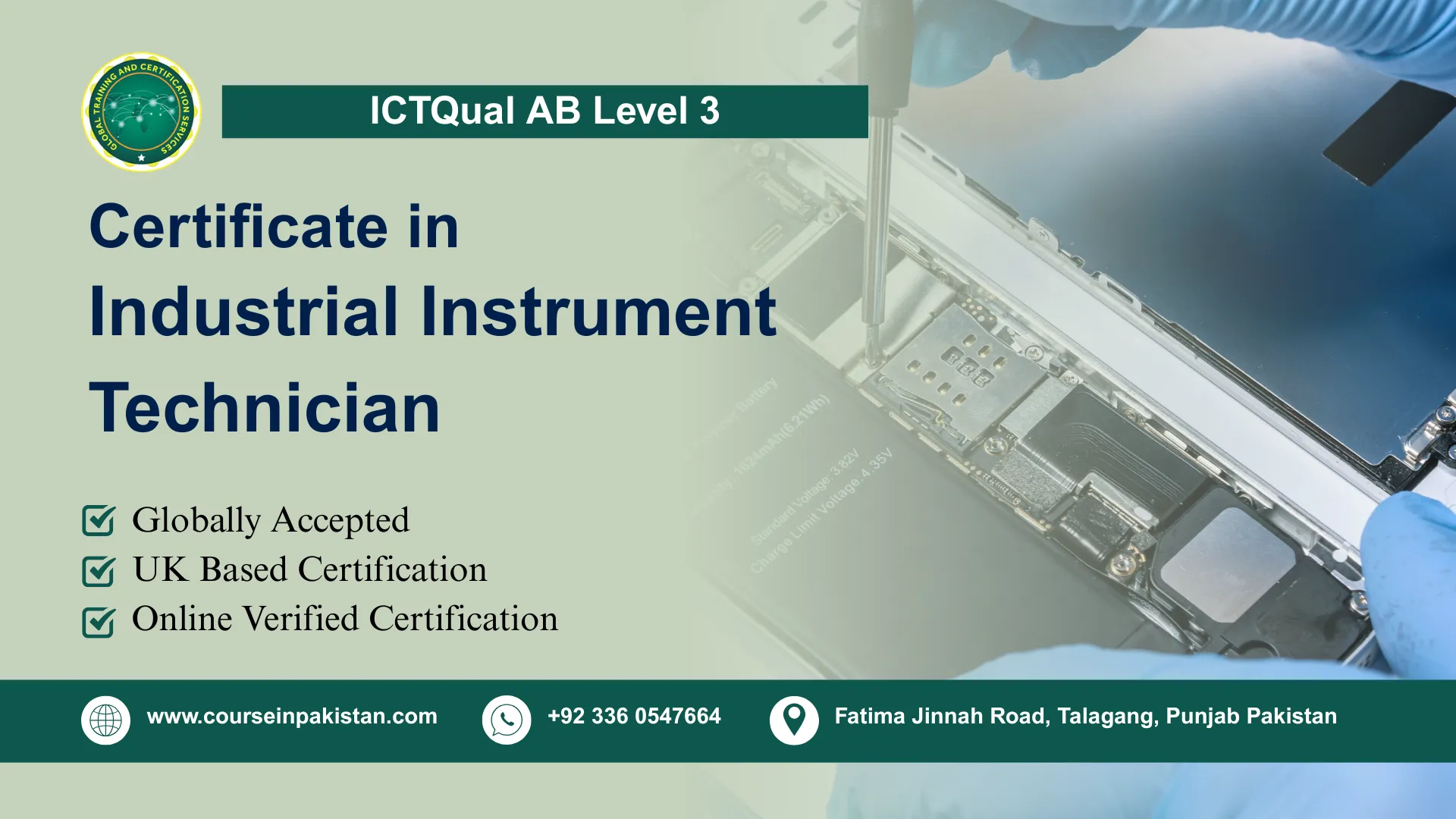
The ICTQual AB Level 3 Certificate in Industrial Instrument Technician is a specialized vocational qualification tailored to develop both the technical expertise and practical competencies essential for success in the field of industrial instrumentation. This program provides learners with a robust foundation in the principles of measurement, control systems, and automation technologies, preparing them to work confidently with complex instrumentation setups. It is ideally suited for individuals aiming to launch or advance their careers in sectors such as manufacturing, oil and gas, power generation, and process control—industries where precision, safety, and reliability are paramount.
Throughout the program, students will gain extensive hands-on experience with a wide range of industrial instruments, including sensors, transmitters, controllers, and analyzers. They will work in simulated industrial environments and training labs that mirror real-world conditions, allowing them to apply their skills in practical scenarios. The curriculum is carefully designed to balance theoretical understanding with practical application, covering essential concepts such as signal processing, control loop dynamics, and system integration. Learners will be trained to install, calibrate, maintain, and troubleshoot instrumentation systems used in complex industrial settings, ensuring they are fully equipped to meet the demands of modern process industries.
By the end of the course, participants will have cultivated a comprehensive understanding of industrial instrumentation principles, safety protocols, and recognized industry standards. They will be proficient in interpreting technical documentation, configuring and maintaining automated systems, and applying diagnostic techniques to resolve instrumentation issues. Learners will also develop the collaborative skills necessary to contribute effectively within multidisciplinary engineering teams, ensuring seamless integration of instrumentation solutions across various industrial processes. This qualification not only strengthens employability in high-demand sectors but also serves as a gateway to advanced certifications.
Course Overview
The ICTQual AB Level 3 Certificate in Industrial Instrument Technician offers a comprehensive learning experience that blends classroom instruction with practical laboratory work. Key modules include electrical and electronic fundamentals, process measurement techniques, control systems, and instrumentation maintenance. Learners will also explore topics such as programmable logic controllers (PLCs), digital communication protocols, and industrial safety regulations.
This course is structured to meet the demands of modern industry, with a focus on real-world applications and problem-solving. Whether you’re a newcomer to the field or a technician looking to upgrade your skills, the Level 3 Certificate provides the knowledge and confidence needed to excel in instrumentation roles. Graduates will be well-positioned to pursue careers in industrial automation, instrumentation engineering, and technical support across a variety of sectors.
Key Highlights of the Course:
- Covers essential topics like process control, instrumentation systems, and automation technologies.
- Practical sessions with real-world instruments such as sensors, transmitters, and PLCs.
- Globally acknowledged qualification that enhances professional credibility.
- Delivered by experienced professionals with deep knowledge of industrial instrumentation.
- Emphasizes industrial safety standards and regulatory practices.
- Career Pathways: Opens doors to roles in manufacturing, oil & gas, power generation, and more.
- Serves as a stepping stone to advanced certifications and engineering degrees.
Course Benefits
The ICTQual AB Level 3 Certificate in Industrial Instrument Technician offers a powerful blend of technical knowledge and practical expertise, making it a valuable asset for aspiring and current technicians. Here’s how learners benefit:
Skill Development
- Gain proficiency in installing, calibrating, and maintaining industrial instruments
- Learn to interpret technical drawings and documentation with confidence
Career Advancement
- Qualify for technician roles in high-demand sectors like automation, energy, and manufacturing
- Increase your chances of promotion and higher salary brackets
Practical Readiness
- Be job-ready with hands-on experience using industry-standard tools and systems
- Understand troubleshooting techniques for real-world instrumentation challenges
Professional Recognition
- Earn a respected certification that validates your expertise and commitment to the field
- Stand out in competitive job markets with a specialized qualification
Lifelong Learning
- Build a strong foundation for further education in engineering or advanced instrumentation
- Stay updated with evolving technologies and industry practices
Whether you’re starting your career or upgrading your skills, this course empowers you to become a confident, capable, and certified industrial instrument technician.
Course Study Units
This qualification, the Level 3 Certificate in Industrial Instrument Technician, consists of 6 mandatory units.
- Fundamentals of Industrial Instrumentation
- Process Variables: Pressure, Temperature, Flow, and Level
- Instrument Calibration and Testing Techniques
- Industrial Sensors, Transducers, and Control Valves
- Programmable Logic Controllers (PLCs) and Process Automation
- Maintenance, Troubleshooting, and Industrial Safety
Learning Outcomes
This course is structured to provide learners with the essential knowledge and hands-on skills required to become proficient industrial instrument technicians. Each unit focuses on a core area of instrumentation, ensuring a well-rounded and practical understanding of the field. Below are the detailed learning outcomes for each unit.
Fundamentals of Industrial Instrumentation
- Understand the role of instrumentation in industrial process control systems.
- Identify and describe key components such as sensors, transmitters, controllers, and actuators.
- Explain the principles of measurement and signal transmission in instrumentation.
- Differentiate between open-loop and closed-loop control systems.
- Interpret basic instrumentation diagrams and technical documentation.
- Recognize industry standards and terminology used in instrumentation.
Process Variables: Pressure, Temperature, Flow, and Level
- Define the four primary process variables and their significance in industrial operations.
- Explore various measurement techniques and devices for each variable.
- Analyze the effects of variable fluctuations on system performance and safety.
- Select appropriate instruments based on process conditions and requirements.
- Calibrate and validate instruments used to measure pressure, temperature, flow, and level.
- Interpret data from process instruments for monitoring and control purposes.
Instrument Calibration and Testing Techniques
- Understand the importance of calibration in maintaining instrument accuracy.
- Perform standard calibration procedures using appropriate tools and methods.
- Identify common calibration errors and learn corrective techniques.
- Document calibration results in accordance with industry protocols.
- Conduct performance testing to ensure instruments meet operational specifications.
- Apply traceability and compliance standards during calibration activities.
Industrial Sensors, Transducers, and Control Valves
- Explain the working principles of various industrial sensors and transducers.
- Select suitable sensors for specific applications based on process needs.
- Understand the function and types of control valves used in automated systems.
- Analyze valve characteristics such as flow capacity, response time, and control accuracy.
- Integrate sensors and valves into control loops for effective process regulation.
- Troubleshoot common issues related to sensor and valve performance.
Programmable Logic Controllers (PLCs) and Process Automation
- Understand the architecture and operation of PLCs in industrial automation.
- Develop basic PLC programs using ladder logic and other programming methods.
- Interface PLCs with field devices such as sensors and actuators.
- Diagnose and resolve common PLC faults and communication errors.
- Explore the role of PLCs in distributed control systems and SCADA environments.
- Implement automation strategies to improve process efficiency and reliability.
Maintenance, Troubleshooting, and Industrial Safety
- Apply preventive and corrective maintenance techniques for instrumentation systems.
- Use diagnostic tools to identify and resolve faults in control systems.
- Understand safety protocols and hazard mitigation in industrial environments.
- Comply with regulatory standards and workplace safety guidelines.
- Maintain accurate records of maintenance and troubleshooting activities.
- Promote a culture of safety and reliability in instrumentation practices.
By mastering the learning outcomes across these six units, learners will be equipped with the technical competence, practical experience, and safety awareness required to excel as industrial instrument technicians. This foundation prepares them for real-world challenges and opens pathways to advanced roles in instrumentation and automation.
Who is This Course For?
This course is designed for individuals who are passionate about technology, precision, and industrial systems. The ideal learner should possess the following attributes:
- Interest in Engineering and Technology: Enthusiastic about industrial processes, automation, and instrumentation.
- Basic Technical Aptitude: Comfortable with mathematics, physics, and understanding technical diagrams.
- Problem-Solving Mindset: Able to think critically and troubleshoot mechanical or electrical systems.
- Hands-On Learner: Prefers practical experience and working with tools and equipment.
- Career-Oriented: Motivated to pursue a stable and rewarding career in industrial sectors.
- Safety-Conscious: Values workplace safety and adheres to operational protocols.
This course is ideal for school leavers, entry-level technicians, or professionals seeking to upskill in industrial instrumentation.
Future Progression
- Upon successful completion of this course, learners can pursue various career and professional development opportunities, including:
- Instrumentation Technician Roles in manufacturing, oil and gas, power generation, and process industries.
- Automation Specialist Positions focusing on PLCs and control systems.
- Field Service and Maintenance Technician roles in industrial plants and engineering firms.
- Supervisory or Team Lead Roles with experience and additional certifications.
- Advanced Technical Certifications in instrumentation, automation, or industrial control.
Academic Pathways:
- This qualification also serves as a stepping stone for further academic advancement:
- Diploma in Instrumentation or Automation Engineering
- Higher National Certificate (HNC) or Higher National Diploma (HND) in Electrical Engineering or Control Engineering
- Bachelor’s Degree in Industrial Automation, Mechatronics, or Electrical Engineering
- Specialized Short Courses in SCADA, DCS, or advanced PLC programming
- These pathways allow learners to deepen their expertise and expand their career options in engineering and technology.
The ICTQual AB Level 3 Certificate in Industrial Instrument Technician is a comprehensive and practical program that prepares learners for the dynamic world of industrial instrumentation. With a strong focus on hands-on training, safety, and technical competence, this course empowers individuals to become skilled professionals in high-demand sectors. Whether you’re starting your career or seeking to upgrade your skills, this qualification offers a solid foundation for long-term success and growth in the field of industrial automation and control.

